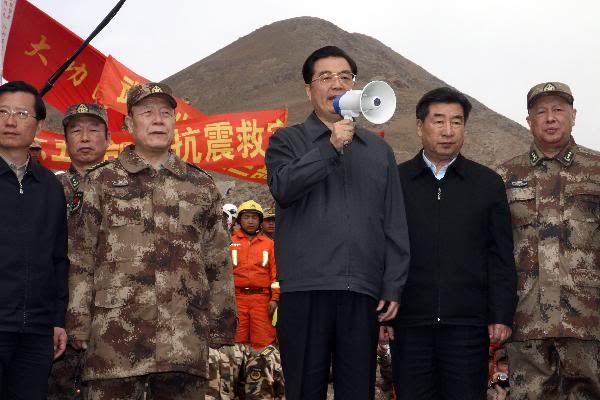
Chinese President Hu Jintao(C)speaks to soldiers of the Chinese People's Liberation Army and policemen carrying out relief work at Zhaxike Village of Gyegu Town in quake-hit Yushu County,northwest China's Qinghai Province, April 18, 2010
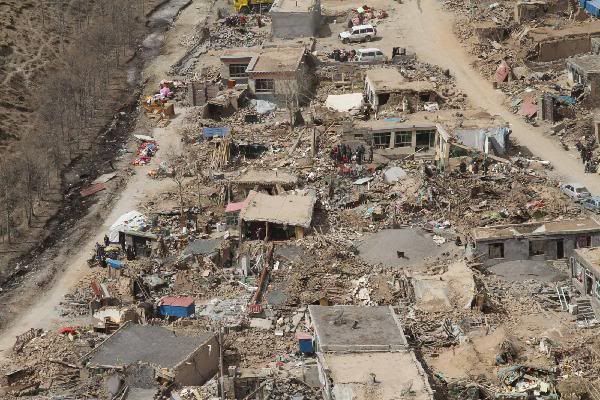
Aerial Image taken on April 16, 2010 shows the quake-hit Yushu County, northwest China's Qinghai Province
China ordered flags be flown at half-staff and a halt to all entertainment, including online games and sports events, for a national day of mourning Wednesday to honor more than 2,000 people killed by a devastating earthquake in a remote Tibetan region.
Similar arrangements were made two years ago following a larger and deadlier earthquake in southern China's Sichuan province that left nearly 90,000 dead or missing. Such high-profile displays of government concern are also likely aimed at tamping any potential unrest among the mostly Tibetan victims.
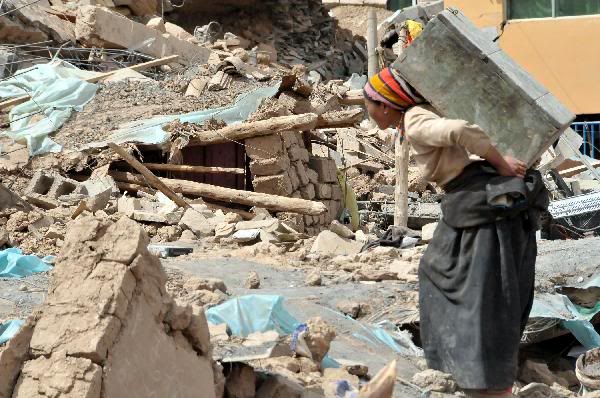
A woman collects her belongs in Gyegu Town, the quake-hit Tibetan Autonomous Prefecture of Yushu, in northwest China's Qinghai Province, April 17, 2010. The 7.1-magnitude earthquake that struck Yushu of Qinghai Province, left 1,484 dead and 312 still missing, and about 100,000 people were relocated.
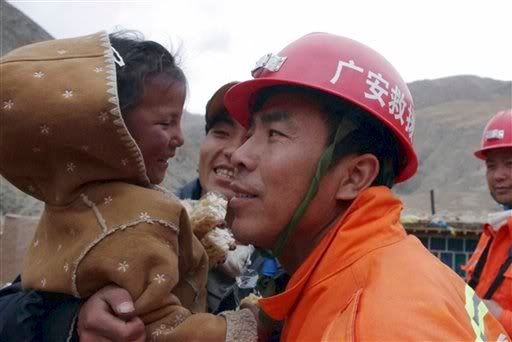
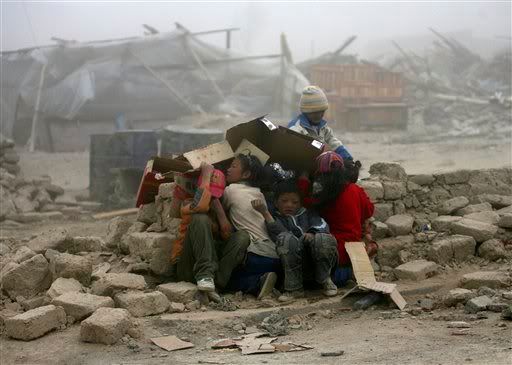
Tibetan anger over political and religious restrictions and perceived economic exploitation by the ethnic majority Han Chinese have sometimes erupted in violence.
The death toll from the massive April 14 quake in remote Yushu county in Qinghai province, high on the Tibetan plateau, rose Tuesday to 2,046, the provincial press center reported. More than 12,000 were injured and 196 people were still missing, it said. By China's measure the quake was a magnitude 7.1, while the U.S. Geological Survey put it at 6.9.
Hail, snow and sleet hit the high-altitude region on Tuesday, slowing rescue work and causing some delays on the main highway linking the disaster area to the provincial capital of Xining. Some aid-laden trucks slowed to a crawl or got stuck on the icy, winding mountain passes.
Three people were rescued Monday, including a 4-year-old girl and an elderly woman who survived under the rubble for five days because relatives used bamboo poles to push water and rice to them until rescuers pulled them out. The rescues were hailed by state media as a miracle and repeatedly played on television news broadcasts.
Six days after the quake, there appeared little hope of finding more survivors in the frigid conditions.
In Qinghai, officials planned to commemorate the dead Wednesday with mourning ceremonies and three minutes of silence across the province, the official Xinhua News Agency said.
Flags will be lowered across the country and at Chinese embassies and consulates overseas, marking one week since the earthquake hit, China's Cabinet announced Tuesday. The Ministry of Culture separately ordered online entertainment, including games as well as music and movie downloads, be suspended for the day. Live entertainment, such as theater and dance performances were also to be postponed, it said on its official website.
Sporting events, including several professional football matches and a China Basketball Association playoff final, were rescheduled and a television broadcast of European football was canceled.
Foreign Ministry spokeswoman Jiang Yu said that by Tuesday, more than 150 countries, international and regional organizations have extended their consolation to the Chinese government and people. "We sincerely appreciate the attention and support."
Jiang said Japan, South Korea, France, the United States and Norway have provided $3.2 million of assistance and donations.
Jiang did not directly answer questions about whether China would allow the Dalai Lama to visit the quake-hit area, saying only that relief efforts were "in good order" and that "the local people's religious beliefs and customs are well-respected."
The exiled spiritual leader had said Saturday he'd like to visit the quake site. China is unlikely to allow a visit.
The Chinese government has poured in aid to Tibet and surrounding regions, such as Qinghai, where residents have frequently chafed under Chinese rule.
China has announced that Wednesday will be a national day of mourning for victims of the devastating earthquake in a remote Tibetan region, as the death toll rose above 2,000.
National flags will fly at half-mast across the country and at its embassies and consulates overseas, marking one week since the 6.9-magnitude quake hit, China's Cabinet said. All public entertainment will be suspended.
Chinese officials said the death toll in remote Yushu county in western Qinghai province, high on the Tibetan plateau, had risen to 2,039, while more than 12,000 people have been hurt. Another 200 people are still missing.
Relief efforts could be hindered by rain expected in the high-altitude region. Sleet, wind, and light snow are forecast for the next three days, said Guo Yinxiang, spokeswoman for the Qinghai Metereological Bureau.
Three people were rescued on Monday, including a 4-year-old girl and an elderly woman who survived under the rubble for almost a week because relatives used bamboo poles to push water and rice to them until rescuers pulled them out.
The rescue of Wujian Cuomao, 68, and Cairen Baji, 4, from a crumbled home in a village about 13 miles from the hardest-hit town of Jiegu was hailed by state media as a miracle and repeatedly played on television.
Relief workers also freed a Tibetan woman named Ritu from the rubble of a hillside house, state broadcaster China Central Television reported. Half her body had been trapped by the debris, the report said, but her vital signs were stable.
In Jiegu, thousands of Tibetan Buddhist monks picked at rubble with shovels, performed funeral rites and threw food to survivors from the backs of trucks.
Relief and reconstruction work accelerated, with power and telecommunications services largely restored and aid convoys arriving in droves.
Convoys of military supply trucks were at a standstill, backed up for miles on the main road. At a supply depot, huge stacks of bottled water were piled up. More relief goods rumbled past mountainside hamlets where residents pitched government-provided tents along a two-lane highway that is the only connection between Jiegu and the provincial capital of Xining, the nearest big city.






0 comments:
Post a Comment